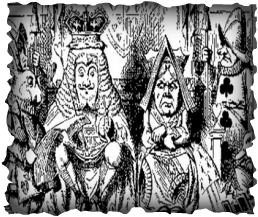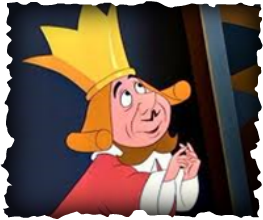KING OF HEARTS
The King of Hearts- Novel
The King of Hearts- 1951 Film
"The judge, by the way, was the King; and as he wore his crown over the wig...he did not look at all comfortable" -p. 129
Lewis Carroll's King of Hearts appears to have more authority in the trial as the Judge to determine who stole the Queen's hearts. He is slightly more respected as a king compared to the film depiction of the King of Hearts (at least the guinea pigs cheer at his cowardly remarks). He is also more soft-spoken and similar to the 1951 King of Hearts, non-threatening. Compared to the Queen of Heart's "OFF WITH HIS HEAD", the King's orders have less impact, "I'll have you executed" (p. 135) when no real action is taken. In addition, Carroll foreshadows the King's ignorance, confused with the word important and unimportant, "as if he were trying which word sounded best" (p. 141) or telling the Hatter to "stand down" after he gave his evidence.
Jury members who cannot even spell "stupid" properly, a letter is deemed to be "the most important piece of evidence" without acknowledging its meaning, a King who asks for a verdict repetitively without logical analysis, and most of all a trial to testify who stole tarts signify the triviality of the legal system.
Lewis Carroll's King of Hearts appears to have more authority in the trial as the Judge to determine who stole the Queen's hearts. He is slightly more respected as a king compared to the film depiction of the King of Hearts (at least the guinea pigs cheer at his cowardly remarks). He is also more soft-spoken and similar to the 1951 King of Hearts, non-threatening. Compared to the Queen of Heart's "OFF WITH HIS HEAD", the King's orders have less impact, "I'll have you executed" (p. 135) when no real action is taken. In addition, Carroll foreshadows the King's ignorance, confused with the word important and unimportant, "as if he were trying which word sounded best" (p. 141) or telling the Hatter to "stand down" after he gave his evidence.
Jury members who cannot even spell "stupid" properly, a letter is deemed to be "the most important piece of evidence" without acknowledging its meaning, a King who asks for a verdict repetitively without logical analysis, and most of all a trial to testify who stole tarts signify the triviality of the legal system.
The King of Hearts is the spouse of the Queen of Hearts; however, he is a very small and intimidated figure compared to the Queen. His smallness (comparable to the size of Dormouse) is representative of his power at court, minimal and unimportant. This is clear when the White Rabbit announces the members present during Alice's trial: "Your majesty, members of the jury, loyal subjects", the King had to remind the Rabbit in order to be announced at court. This illustrates his social status, forgotten and even more insignificant than the loyal subjects. Although he is quite powerless, interestingly the tempered Queen seems to oblige to his suggestions and pats on his little head; for example, he was the one who asked for a trial and the calling of witnesses. The King carries the title of a monarch, but he does not have the authority and status as one. The Queen and King of Hearts least resemble wife and husband, but more similar to a demanding mother and a submissive child.
There has been suggestions that this obvious difference in size between the male and female is to illustrate the empowering female during this era, Queen Victoria who led Great Britain during a prosperous time of change and expansion of the empire.
There has been suggestions that this obvious difference in size between the male and female is to illustrate the empowering female during this era, Queen Victoria who led Great Britain during a prosperous time of change and expansion of the empire.


